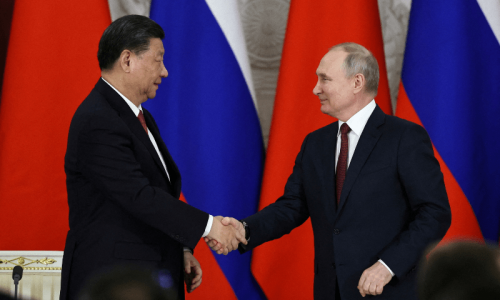WASHINGTON, June 29: A key US Senate committee gave initial approval on Thursday to a deal for sweeping civilian nuclear cooperation with India, hailing it as the beginning of a new era of Washington’s relations New Delhi.
The Senate’s foreign relations committee approved the bipartisan legislation, setting rules for final approval, on a 16 to 2 vote, ignoring concerns that a nuclear agreement with a country which had not signed the non-proliferation treaty would encourage proliferation.
This is the second major congressional victory for the deal. On Tuesday, the 50-member House’s international relations committee voted 37 to 5 to support the legislation, which would grant India access to US nuclear fuel and reactors for the first time in three decades.
“The agreement with India … is the most important strategic diplomatic initiative undertaken by President George W. Bush,” said the committee’s chairman, Republican Senator Richard Lugar of Indiana who, along with ranking Democratic member Joseph Biden, introduced the bill.
The 18-member committee discussed whether to amend the 1954 Atomic Energy Act to enable the US to sell nuclear fuel and technology in return for non-proliferation and safeguard commitments from India.
Significantly, the draft of the bill circulated hours before the committee’s meeting, didn’t have a reference to Iran as did the bill presented before the House committee, which contained a non-operative provision seeking India’s ‘full and active’ participation in American efforts to curb Tehran’s nuclear ambitions.
But Senator Lugar noted that “India’s votes at the IAEA on the Iran issue last September and this past February demonstrate that New Delhi is able and willing to adjust its traditional foreign policies and play a constructive role on international issues.”
Noting that the deal allows India to access nuclear fuel, technology and reactors from the US, which were previously denied as New Delhi did not ratify the Non-Proliferation Treaty, Senator Lugar said Washington would ensure that the civilian nuclear agreement would not ‘undercut’ its responsibilities under the Treaty.
“The agreement can be a lasting incentive for India to abstain from further nuclear weapons tests and to cooperate closely with the United States in stopping proliferation,” Mr Lugar said.
Before Congress can give final approval, US-India negotiations on the technical details of the nuclear cooperation agreement must be completed, as must India’s negotiations with the International Atomic Energy Agency on a system of inspections for New Delhi’s civilian nuclear facilities.











































Dear visitor, the comments section is undergoing an overhaul and will return soon.